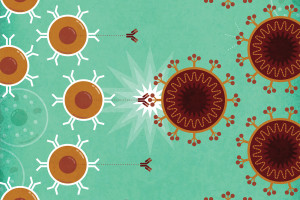Everything You Need to Know About COVID-19 Antibodies
Philly biotech founder Ben Doranz explains the importance of understanding how COVID-19 antibodies work and why it may be too soon to declare anyone as being immune to the virus.

Ben Doranz, president and chief executive officer of the Philadelphia-based biotechnology company, Integral Molecular, explains COVID-19 antibodies. / Courtesy
There is so much that doctors and scientists still don’t know about the coronavirus, COVID-19. Despite more than 1,800 clinical trials for COVID-19 underway worldwide, scientists still do not know for sure whether people can contract the virus more the once, how long it takes for the immune system to develop antibodies against the virus, or which types of COVID-19 antibodies are capable of destroying the disease.
Antibody tests are likely to play a critical role as states across the country prepare to loosen stay-at-home orders and reopen businesses this week because the tests help cities calculate how many people have contracted the virus. But current antibody tests aren’t capable of measuring an antibody’s protective capability and not all antibodies are capable of blocking virus infection. Philadelphia biotechnology company Integral Molecular has developed a new antibody test that researchers are now using to detect the presence of neutralizing antibodies that offer protection from disease.
NextHealth PHL spoke with Integral Molecular president and chief executive officer, Ben Doranz about how antibodies prevent infection and how his company’s new test could become a critical tool for bringing the coronavirus pandemic to an end.
NextHealth PHL: Can you just briefly explain what antibodies are and how they work?
Doranz: Antibodies are important for protecting us for the long term. So, once we have protective antibodies against any virus, we’re protected from it; we can’t be infected by it or harmed by that virus anymore. That’s why we get vaccines. Vaccines, protect us, sometimes for life, against a virus. So, you’ll never get the measles virus again, for instance, because if you’ve been vaccinated, you have antibodies that kill the virus the moment it gets into your body.
How useful are the COVID-19 antibody tests that are currently on the market and what do they tell us about the virus?
In this situation, there are two different kinds of antibodies: There are protective antibodies and there are non-protective antibodies. So, many of the antibodies that will generate in our body, they see the virus, they may bind to it and react with that virus, but they don’t kill the virus. And many of the existing tests just tell you whether you have any antibodies against the virus at all. But the virus is smart; it’s unfortunately very smart. And what the virus tries to do, like HIV and many other viruses like influenza and others, is the virus tries to hide, and it’s very good at doing this. It hides from the antibodies and the immune system. So, what happens is that you generate antibodies against the virus, but only a very small number of them or only a very limited type of them can kill the virus.
Tell me about the antibody test Integral Molecular has developed. How is it different?
Most antibody tests tell you whether you have any antibodies against SARS-CoV-2, the virus that causes COVID-19. Our antibody test tells you whether you have protective antibodies against the virus, and it does that by measuring the infectivity of the virus. In the lab, we take a virus that we’ve engineered to express an easy-to-read reporter. So, it’s basically fluorescent green or it gives off light. It’s not essentially a real virus, but it looks like the real virus from the outside. And we can use that tool to test any antibody, any serum, or any drug to see if that antibody or that serum or that drug can kill the virus and stop it from infecting a cell in the lab.
So, what our technologies are all geared toward is identifying the antibodies that are protective. These are antibodies that are neutralizing; that if they see the virus, they’ll kill the virus. And those are the important ones that we want people to have and that we want to be able to detect in people.
We’re providing that technology, for free, to dozens of vaccine companies and therapeutic companies as well as many research labs so that they can use this for their own studies. This is enabling better vaccines to be developed, better therapeutics to developed and, and more research to happen so we can understand the virus even more.
There’s a lot of conversation about using antibody tests to grant ‘immunity passes’ of some kind for people who’ve already contracted the virus and recovered. How much should states be relying on widespread antibody testing as part of their reopening strategies?
I think there’s a lot being made of that idea right now but there’s a long way to go before we get there. And there’s probably also a lot of misunderstanding about how this works because again, a lot of the current antibody tests don’t tell you that you’re protected, they tell you that you have some antibodies, but those antibodies may have little or no protective value. You still may be very susceptible to getting the virus. So, even if you’ve been infected already, you may still be able to get infected again because even if you have antibodies, they may not be able to stop a second instance of the virus from getting into you and infecting you again, a week later or a month later or a year later.
We’re not sure about the timing of these things yet. But what we do know is that the virus is smart and it knows how to avoid the immune system, and how to avoid all of your natural defenses. And our job as scientists and vaccine developers and therapeutic developers is to outsmart the virus, to make a vaccine and a drug that it can’t avoid, that it can’t escape from. It may be too soon for these so-called immunity passes because just because you’re protected today, we don’t know yet how long that protection is going to last. That’s what our test is designed to answer.
If these tests can’t tell you if your antibodies are protective, should people be getting these other antibody tests at all?
I think everyone should still be tested as much as possible if they think that they’re exposed and the normal tests are testing for the virus itself. The PCR test is a test for the genetic material of the virus and that tells you if you’re infected now. But if the virus has gone away, that test is going to come up negative, but at that point, you might have antibodies, so then you’d need a different test. And that new test will tell you if you have antibodies against the virus. And if you do, then the question is: Are they protective antibodies that will keep you safe, or are they essentially useless antibodies that won’t protect you? And that’s an important question before someone goes into public spaces and assumes that they’re immune.


